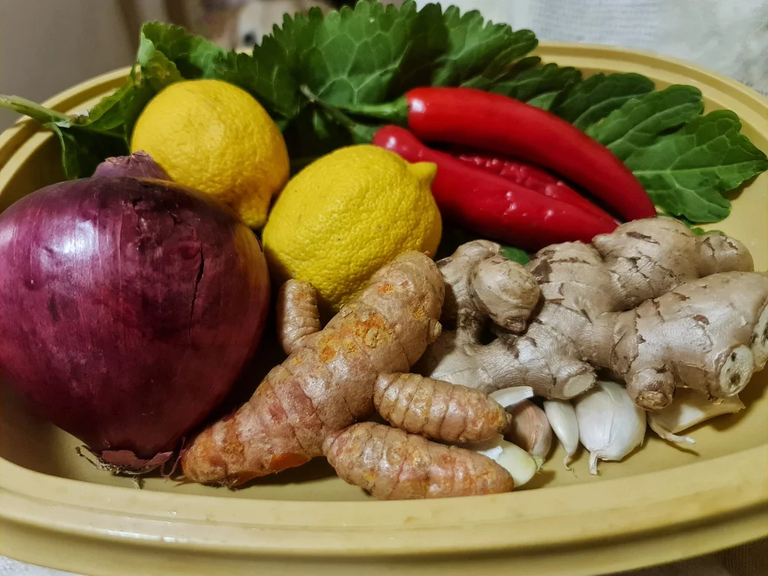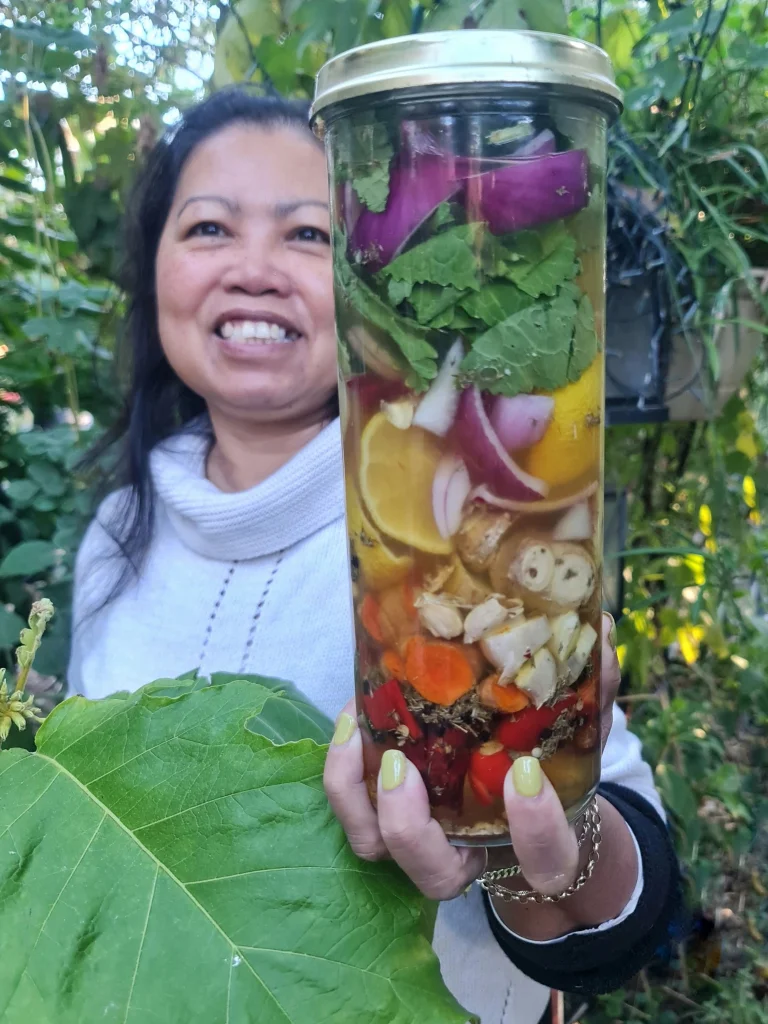Fire Cider is a lot of people’s go to remedy for colds and flu. It is best used as a preventative to stop chills from entering the body or pathogens from gaining a foothold but can provide symptomatic relief too. It includes a range of herbs that have warming, diaphoretic properties and many antimicrobials too. It’s a real shotgun approach to remedy making but includes literally everything that can have an effect.

The brew is also based on Apple Cider Vinegar, which has its own immune system and general health boosting properties. The whole thing is made from common herbs that are easy to grow or buy in your local area and takes no great skill to make. It is probably the premiere folk remedy!
Ingredients
Fire Cider can include a wide range of herbs and plants , all of which have their own, well deserved, reputation for fighting colds and infections. I won’t go into detail about each of them, their reputations precede them. The ingredients can vary according to availability and location but the core ingredients are usually the same in everyone’s recipe –
- Apple Cider Vinegar
- Chilis
- Garlic
- Ginger
- Horseradish
- Lemon
To that, folks add any or all of the following –
- Honey
- Turmeric
- Onion
- Cardamom or Fennel – warming carminatives to help a potentially upset stomach
- Microbe killing herbs such as Sage, Thyme, Oregano, Rosemary, Basil…
- Elderberries – potent antiviral
- Astragalus – can boost white cell numbers if used as a preventative
- Burdock/Dandelion Root – liver support and prebiotic
- Himalayan Sea Salt or Murray River Salt – to add some micronutrients to our diet in times of physical stress.
How to make your own Fire Cider
This is so simple! Get yourself a jar or other container big enough to hold your batch, cut the big stuff into chunks, crush seeds and finely cut your herbs. I like to use a glass container and leave pieces quite large because I enjoy the visual effect of seeing all that good stuff in the jar. I suppose you could throw it all in a blender but where’s the appeal in that?
Don’t add the honey yet. I don’t know why but it seems to work better when added after straining.
Put it in a jar and cover with Apple Cider Vinegar. Put a lid on it and hide it away from direct sunlight (as you do with most herbal remedies) for 2 weeks to a month.
Strain it, mix your honey into the strained Fire Cider and bottle for use.
When you’ve made a batch and are happy with it, it can store in the fridge for up to a year apparently, but I’ve always used mine way before that!
Why Burdock/Dandelion Root?
This is one of my little tweaks to the recipe. Both of these herbal ingredients have a two-fold purpose in my recipe and are easily exchangeable if you only have one or the other.
First, they both contain Inulin which is a starchy substance that is used by gut microbes and a favoured food source. Our little helpers pump out many of the compounds used by our immune system and our brain to stabilise our mood, so giving them a prebiotic treat when we are sick can help a lot. Also, if you’ve fallen victim to a Doctor who has prescribed antibiotics, the Inulin will help you keep the gut microbes that the antibiotics don’t kill off.
Secondly, both Burdock and Dandelion Roots support our Liver, which works overtime when we have a cold, eliminating all of those waste products. Helping it ahead of time with these herbs in our preventative brew can save us a little grief.
Using your homemade Fire Cider
As a preventative, the traditional dose is a shot glass full every day. That’ll get enough into your system, to keep your system warm from the inside and dose you up with antimicrobials. I add Elderberries to my brew because they are a potent antiviral in their own right.
If you’ve got the lurgi (and if you know what that means, you’re showing your age!) or similar ailment, several teaspoonfuls throughout the day are in order.
If a congested chest is the issue, soak a cloth in Fire Cider and place it on the sufferer’s chest so that it can penetrate and relieve congestion – it’s as good as Vick’s! When I was a tacker, I suffered terrible bronchitic during the English Winter and was literally bathed in Vicks. Now I can't stand the smell of the stuff, so bring on the Fire Cider!
It’s apparently quite effective for arthritic pain when used soaked into a cloth and put onto the affected area. I haven’t used it in that way yet but all the signs for success are there.

Some of you may have seen that I've been writing a series of posts about herbs and making herbal remedies at home. I want to share what I know of this topic so that, as the world gets crazier, folks will have other avenues of medical care, namely those of themselves and their community. If you look back over this blog, you can see heaps of info on the topic, plus loads and loads of posts on herbs and using Australian bushfoods from a white perspective. If you haven't been around on in the @hivegarden and @naturalmedicine communities for long, you may be interested in looking back. There's w-a-a-a-a-y too much there for me to repost and the Hive system doesn't let you vote on old posts so, if you're happy with what you find, I believe that there is now a tip option...





Working in the dust at my old job, I started getting blockage and infections in my salivary glands. Fire Cider (we call it Master Tonic) was a better cure for that than antibiotics.
That's great to hear! It is a potential brew. Just wondering, did you ever try the herb Spilanthes at the time? I'm currently researching its herbal benefits as a sialogogue, that is, promoting salvation.
Yes, in the last batch we made. It is absolutely amazing as a sialogogue, and pretty good as a topical anesthetic. The raw plant, however, tastes a bit like putting your tongue on a 9V battery!
I'm kind of addicted to the sensation! It's the first time I've encountered the plant, it's not widely grown here in Oz.
This recipe is pure gold.
I want to try to make some stuff like this to take as a wellness supplement, and your guide makes it easy to learn how. Reblogging so I can visit this guide in the future!
Awesome information and very well put together, thank you for sharing!
Always happy to share this kind of info. I'm glad you appreciated it please,feel free to reblog it and share it around!